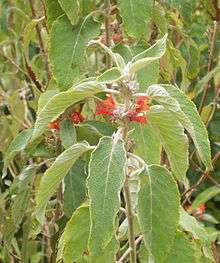Colquhounia
| Colquhounia | |
|---|---|
 | |
| Colquhounia coccinea | |
| Scientific classification | |
| Kingdom: | Plantae |
| (unranked): | Angiosperms |
| (unranked): | Eudicots |
| (unranked): | Asterids |
| Order: | Lamiales |
| Family: | Lamiaceae |
| Genus: | Colquhounia Wall. |
Colquhounia is a genus of about six species of evergreen or semi-evergreen shrubs or subshrubs in the family Lamiaceae, first described in 1822. They are native to the Himalaya and southwestern China south to Peninsular Malaysia.[1][2]
They are shrubs growing to 1 to 3 meters tall, rarely to 4 meters. The aromatic leaves are 3 to 12 centimeters long and 1 to 6 centimeters broad, finely toothed and borne in opposite pairs on the square stems. The flowers are tubular, two-lipped, and carried on terminal spikes.[2]
Species include:
- Colquhounia coccinea Wall. - Tibet, Yunnan, Bhutan, Assam, Arunachal Pradesh, Myanmar, Nepal, Thailand
- Colquhounia compta W.W.Sm. - Sichuan, Yunnan
- Colquhounia elegans Wall. - Yunnan, Myanmar, Thailand, Vietnam, Laos, Cambodia
- Colquhounia seguinii Vaniot - Guangxi, Guizhou, Hubei, Sichuan, Yunnan, Myanmar
- Colquhounia vestita Wall. - Yunnan, Assam, Bhutan, Nepal, Himalayas of northern + eastern India
References
- ↑ Kew World Checklist of Selected Plant Families
- 1 2 Colquhounia. Flora of China.
This article is issued from
Wikipedia.
The text is licensed under Creative Commons - Attribution - Sharealike.
Additional terms may apply for the media files.